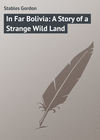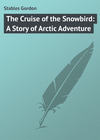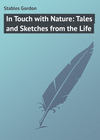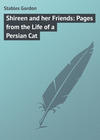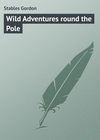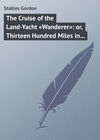Kitabı oku: «Kenneth McAlpine: A Tale of Mountain, Moorland and Sea», sayfa 9
Chapter Seventeen
A Tale Told on the Sea of Ice
“The mariner whose eye is bright,
Whose beard with age is hoar.”
Coleridge.
Scene: The good ship Brilliant in the Doldrums. Crew at their Christmas dinner. The doctor continues his story.
“‘In the year 18 – , I sailed from Hull in the good barque Constance, bound for Jan Mayen and Spitzbergen, in pursuit of seals and walruses. I was a very young man then, and, indeed, white though my hair be and snowy my beard, I am not old yet. It is not age that has made me grey, but grief, and one of the most terrible experiences it has probably ever been the lot of man to undergo.
“‘Our voyage to the Arctic seas was a pleasant enough one. We did not encounter a single gale, and we made the country in less than a fortnight. We met the seals a little north of Mount Beerenberg, coming southward to the low pack ice in thousands; nay, but in millions; for the sea was black with their beautiful heads for miles on each side of our ship, and as far north as we could see from the masthead. Oh, didn’t our hearts beat high then! We saw fortune within our reach, and had bright visions of a splendid voyage, a ship full to the hatches, with bings of skins on deck, and an early return to sunny England, our sweethearts and wives. We put about and followed the seals, and ere many days were past had the satisfaction of seeing them take the ice. There would soon be enough to fill all the ships in the Greenland fleet. We had but to wait a week or two until the young were big enough to capture. What a happy crew we were now! It was singing forward and laughing aft, all day long. But alas! and alas! for the fickleness of fortune, a wretched, greedy old Dutch ship came in, and no sooner saw the seals on the ice than she lowered her boats, and in spite of our remonstrances, proceeded to the ice. Twenty-four hours afterwards there was not one single seal, of all the myriads that had taken the ice, visible anywhere, above or below – the Dutch boats had scared them all away. It was all our captain and myself – I had only that spring got my certificate as mate – could do to prevent our men from boarding the Dutchman, and taking summary vengeance on that idiot skipper and his idiot crew.
“‘We got up sail as soon as possible, and began forging through the loose pack ice, in the hope of again falling in with fortune in the shape of seals. We did sight them far in towards the west, and on heavier ice than we generally cared to venture among; but we did not think twice about the matter then. We worked our vessel in, and in, and in, towards our game, when the wind failed us all at once, and every seal disappeared as if by magic, or as if they had been but phantoms of the brain. To add to our grief, hard frost set in, and lasted for many weeks. We hoped against hope we would get clear before long, and still be in time to follow the old seals northwards toward Spitzbergen. So we dreamt. Well, clouds banked up on the southern horizon at last, and snow fell, such snow as I had never seen before, and have seen but once or twice since. Every flake was as big as a hand. In less than twelve hours the whole of that vast ice-pack was one level surface, one unbroken field of dazzling snow. But then came the wind – a fierce and fearful gale – and the bergs rose and fell around us and tossed and tumbled, as if we had been in the middle of a troubled sea, the waves of which were walls of snow. Our barque was heaved up, now forward, now aft, and ground and torn, till we could hear the very timbers cracking and rending beneath us, and we knew then she was doomed – knew that when the ice that nipped her receded, and the pressure abated, she would sink. This happened sooner far than we could have believed possible. While the wind still roared through the rigging, and all between decks was as dark as a winter midnight with the clouds of drifting, driving snow, suddenly the sides of the saloon, in which the captain, myself, and the other mate were sitting, came crashing and splintering in upon us, and we had barely time to spring to the companion ladder before the freer ice was grinding amid a chaos of broken boards and timbers in the very place where we had been sitting barely three seconds before. Almost at the same moment the after-part of the ship took fire.
“‘How this happened I cannot tell. Friction itself would fire the rum, or the blazing coals from the broken stove might have been thrown among the staved casks. Explosion after explosion occurred; then the water rushed forward, and the vessel began at once to be sucked under. We had barely a quarter of an hour to clear out, but even in that short time we managed to land three boats with blankets and provisions on the ice, and this, too, in spite of the storm, in spite of the numbing wind, and the drifting, choking, powdery snow.
“‘We huddled together beneath the boats for hours and hours, and when the wind went down at last, we crawled out – those who could crawl – the living from among the dead, the maimed and sick. Out of a crew of thirty-nine only twenty-four answered to their names the morning after the wreck of the good barque Constance. We sunk the dead between the bergs, and waited for others to die – waited days and days; then the remainder of us started southwards with two of the whalers to seek for the open water. The frost had set in again harder than ever, and the sun was very bright, but it was a terrible journey, nevertheless, and five more of us, including our captain, succumbed to cold and hardship before we stood at last on the edge of the solid pack with the open water all before us.
“‘Ay, there it was – the open water, the Southern Sea – black as ink in the foreground, blue beyond, and dotted here and there with little floating bergs, just as the sky above was flecked with little fleecy, floating clouds. And we knew well that hundreds of miles beneath the horizon lay Iceland, the country we must try to reach, even if we perished in the attempt.
“‘We launched our boats and grasped our oars, and so began our long and dangerous voyage. Provisions we had, and compasses; water we had none, but we took on board huge pieces of fresh-water ice that we were lucky enough to find on top of the salt sea bergs.
“‘All went well for days and days, and, much to our joy, a breeze sprang up. The sail was set. We were so far south now that, summer though it was, the sun set; then we steered by the stars, for as yet clouds had not obscured the sky. I had command of our boat; the steward had charge of the other.
“‘One morning I was saddened to see a body launched overboard from our companion boat, which was a little way ahead at the time. As we sailed up I had just time to notice it was the steward himself ere a terrible specimen of the hammer-headed shark sprang, monster-like, out of the sea, and next moment the body had disappeared.
“‘The rugged mountain peaks of Iceland at last! With what joy we hailed them, only those who have been so situated can understand or appreciate. Yes, the mountains were very rugged, very much peaked and jagged, but we knew that in the freer glens betwixt them, and at the head waters of many a lonely fiord, dwelt a rude but kindly-hearted people, who would gladly welcome and shelter the shipwrecked mariners.
“‘And in two days at the furthest our trials would be over; so we fondly imagined. Alas! they were but beginning. In a few hours after we had sighted the distant hills the wind completely failed us, while up from the south came, rolling and tumbling along the surface of the ocean, a bank of dark fog, and we were soon completely enveloped. We called to the other boat to keep near us, and trusting now entirely to our compasses, we took to our oars once more.
“‘For half a day our boats kept together, but as soon as night and darkness fell, the wind got up, and the sea became rough, dashing continually on board of us, and necessitating constant work in baling. Towards morning the wind had increased to a gale, and we were running before it under our small, closely reefed mainsail and a trifle of jib. Where we were running we knew not, and, I think, hardly cared. We were completely exhausted with the wet and the cold. Our ice and the provisions were gone, and even the compass lost.
“‘The sun broke through the fog at last, and to some extent the wind abated, but the sea still ran houses high. I looked up from the place where I sat, mechanically grasping the tiller. Heavens! what a sight I witnessed! When night had come on, we had been seven in our boat; now we were but three, that is two more than myself. Of the others two had leapt overboard mad, or been washed away; two sat alive but pale and ghastly, grasping in white-blue hands, that I could see were sadly frost-bitten, the icy sheets of the sails. One poor fellow was curled up dead under the bows; the other had fallen backwards over a thwart as if he had caught a crab, and there he lay with his long yellow hair floating in the water with which the boat was half full, and his sightless eyes turned sunwards.
“The life still there upon his hair,
The death within his eyes.”
“Bale, men, bale the boat,” I cried, “bale her, or we shall sink.”
“‘They turned their awful cadaverous faces towards me, they opened their mouths as if to speak, but a sound ’twixt a moan and a gurgle was all that came from their throats; then they lifted their hands and tapped the backs of their fingers against the gunwale of the boat, and they rattled as if they had been made of wood, so sorely were they frozen.
“‘Many, many times during that long and dreadful day did those two poor fellows turn towards me, and they kept signing, signing to me for the help they were pleading for in vain, and ever from their throats came that awful gurgling moan. Oh! men, I think I see and hear them now.
“‘Night fell at last, night and pitchy darkness, and next morning I was alone on the sea. Alone with the dead!
“‘And all that day I sat there, as if in the power of some strange nightmare. The use of every limb I retained as well as that of head and body, but still I did not or could not move, but I kept praying, praying not for the cold and icy wind to fall, not for the clouds and fog to roll away, or the sea to go down, but praying for death, a share of the death I saw around me.
“‘Towards the afternoon I think I must have slept or fallen into a kind of a trance. The wind had quite gone down when I again recovered a sort of consciousness. There was no more broken water, but a heavy tumbling swell on the eastward when I looked. These huge heaving smooth waves seemed to take on the appearance of monsters of the deep, raising their awful heads and backs, grim and grey and cold, above the sea; but westward they were moving masses crimson and black. The sky was a wonderful sight. From the sun’s upper limit to the zenith it was hung with curtains of blue-grey clouds, one behind the other, as it were, the edges all zig-zagged and fringed with red. All round the sun itself was a coppery haze. To the north the sky was clear and of a bright lemon yellow; to the east it was clear also, and green.
“‘I sat gazing at clouds, and sky till they faded into the gloom of night; they got thinner and thinner then, and stars shone through them, and soon they vanished entirely, and the stars had it all their own way.
“‘I felt no hunger, no thirst, no pain, no pleasure; my condition was one of pure apathy; my very soul appeared dead within me.
“‘Soon a bright light shone out of the north with tints of carmine, pale yellow, and green; it was the aurora, and long fringes of pale phosphorescent light descended from the sky overhead. I could have touched them with my hand had they been tangible. They were independent of the far-off aurora. They assumed the forms of gigantic fern leaves and danced dazzlingly before my eyes, and I could almost imagine they emitted a hissing, crackling sound.
“‘Then my brain began to reel, and I fell forward in the boat among my dead companions.
“‘A shock awoke me at last. Cold and shivering now, I sat up and rubbed my eyes. Morning was breaking gloomy and grey over the sea, and some gulls were wheeling and screaming about in the air.
“‘Once again the shock, and the boat trembled from stem to stern, and some birds rose up out of the bows and floated slowly away. They had been gorging on the dead.
“‘The shocks to the boat were easily accounted for: the sea was alive with monster sharks.
“‘O God! men, it was a fearful sight. There was something appalling and horrible in the very way they gambolled around the boat. Their eyes told me one thing: they had come for the dead – and the living.
“‘I cannot tell you whether I really did lift the bodies of my late companions and throw them overboard. I would even now fain believe this was but a dream. If so, it was terribly real, the fighting, wrangling sharks in the sea, the birds wheeling and screaming above.
“‘My boat was picked up that day by some Icelandic fisherman; there was no one in it but myself, men, white in hair, white in beard, as you now behold me.’”
So ended the spectioneer’s story, and so ended that Christmas dinner in the Doldrums, but both Kenneth and Archie long, long after this used to speak about it amid other scenes and in other climes, and both agreed it was one of the pleasantest afternoons ever they had spent in life.
The two friends made many a voyage together in the Brilliant, and together came through no little adventure, and saw many a strange sight in many a strange sea. They came to love the vessel at last, for real sailors do love their ships. They loved her and called her the saucy Brilliant, and the dear old ship, and quite a host of other pet names.
“But alas! and alas?” said Kenneth to Archie one day, while they stood together on the quarter-deck, “we are not making our fortunes. We will never get rich at sea. And by-and-bye, you know, we’ll be getting fearfully old.”
“Yes,” said Archie, “I’m feeling old already. We are both of us over twenty.”
“Sad thought! yes?” added Kenneth. “So I propose we leave the dear old stupid craft at the end of this voyage, Archie.”
And so they did, reader. And thus our tale runs on, but the scenes must change.
End of Book Two.
Chapter Eighteen
On the Unknown River
“Most glorious night,
Thou wert not sent for slumber! let me be
A sharer in thy fierce and fair delight.”
Byron.
Scene: Night on an unknown river, which, dark and deep and sluggish, is rolling onwards to the distant ocean through a wild and beautiful district in the interior, nay, but ill the very centre of Africa. The centre it may well be called, for it is near the equator, and hundreds of miles from the Indian Ocean. Night on the river, but not darkness. A round moon has risen, the clouds, dazzled by its splendour, have parted to let it pass; its light is flooding hill and dell and forest, and changing the river itself to – apparently – a moving flood of molten gold.
Light, but not darkness. Night, but not silence either. Were it possible for any one to pass swiftly and unseen along the banks of the unknown river at such an hour and on such a night as this, what sights he would see, what sounds would fall upon his listening ear! Come with me in imagination! Take heed of those rocks; they are slippery at the edge, for the rainy season is not yet past. To fall into the stream would mean an ugly death, were you even as good a swimmer as the gallant Webb. There are no signs of life in the water, it is true, but the plash of your fall would raise a score of awful heads above it; the crocodiles would be upon you with lightning speed, and rend you from limb to limb.
Peer over the cliff just there. What is that lying on the mud close by the river? Is it the trunk of some dead tree? Drop a pebble on it. See; it moves off into the river and slowly disappears – a crocodile.
Hark to that horrible sound! it makes the very “welkin” ring, – a loud, discordant, coughing, bellowing roar. It is the lion-king of the forest. He loves not the moonlight. It baulks him of his prey; so there is anger in that growl. But you hardly can tell whence it comes; at one moment, it sounds over yonder among the rocks, next, down in that lonesome ravine, and next, in the forest behind you.
Look at those great birds. They fly so closely over our heads that their mighty wings overshadow us for a moment, and we can hear the rustling, creaking sound made by their feathers. There is something lying dead in the valley beyond the hill, and these are vultures going to gorge by the moonlight.
Two great necks are raised like poles behind a rock as the birds fly in that direction. Giraffes, who have been sleeping – there in the open, their heads leaning on the rocks, their ears doing duty even in slumber, but ready if danger draws near to —
“Burst like whirlwind o’er the waste,
To thunder o’er the plain.”
In yonder, beneath that flowery, ferny bank, is the leopard’s cave – the tiger cat. If you went near enough you would see her fiery eyes, and hear a low, ominous growl that would chill you to the spine.
Yes, wild beasts and wild birds keep close to-night; for a little while only; when the deer and the antelope steal down to the river, they will come forth, and there will be yells and shrieks of anger, pain, and terror, and an awful feast to follow.
Behold those lordly elephants; how they trumpet and roar! They are excited about something.
Something unusual has happened, or they would not be there at this hour. Ha! There is a boat on the river, creeping up under the shadow of the rocks. What mystery is this? There are white men in it, too, and right merrily they are paddling along. But never before have the waters of this unknown river been stirred by oar of European.
For not only is the country all around here a wild one, but it has the name, at all events, of being inhabited by a race of savages that are never at peace, who are born, live, and die on the war-path – the Logobo men.
“Couldn’t we go a little nearer?” said Harvey, who sat in the stern sheets near the tall Arab Zona, who was steering, Kenneth and Archie having an oar each.
“Couldn’t we go a little nearer and have a shot at that elephant?”
“No, no, no,” cried Zona, hastily; “we must keep in the shade, gentlemen. Even the moon is not our friend, pleasant though her light be. But the sound of your rifle would raise the Logobo men, and a thousand poisoned arrows would soon be whistling round our heads. We could not escape.”
“Before morning,” said Kenneth, “according to your reckoning, my good Zona, we should be well through the Logobo country, and among friends?”
“True,” replied Zona; “we will be among friends all the way to the land of gold, I trust.”
“The land of gold!” exclaimed Kenneth; “what a fascinating phrase! Zona, when we met you in Zanzibar our lucky stars must have been in the ascendant.”
Zona gave a little laugh.
“It is the land of gold,” he said, “that we are going to, it is true; but no man that ever yet tried brought that gold down to the coast.”
“And why, my friend?”
“Why? I cannot tell you all the reasons why. They say the gold is guarded by evil spirits, that the hills where it is to be found are encircled by giant forests, by terrible swamps, the breath of which is more feared by the Arab than spear of savage foeman.”
“We can but try,” said Kenneth.
“Zona,” said Archie, “did ever you hear the line of that old song, ‘The March of the Cameron Men,’ which says, ‘Whatever a man dares he can do’?”
“Gentlemen all,” replied Zona, “the Arab is the most daring of all men who live; the Arab has sought this gold that we are going in quest of; the Arab has failed! I have spoken.”
“Worthy Zona,” said Harvey, laughing, “you have an excellent opinion of your people, and an excellent opinion of yourself. Nay, never start, man. I love you for it. But let me tell you this. There is one thing in which even an Arab gold-seeker, with all his pluck and daring, may fail in – ”
“And that is?” said Zona.
“Knowledge of prospecting.”
“I am in the dark as to your meaning,” said Zona.
“I know you are, and so are all your people. In other words, then, they don’t know where to look for the gold. Now listen, friend. I have spent years and years in the gold regions of California – ”
“I say, Harvey, old man,” said Kenneth, “you weren’t much the better of it. Eh?”
“True,” replied Harvey, with a sigh; “else you wouldn’t have found me working as an ordinary seaman before the mast in a craft like the Brilliant.”
“Forgive me,” said Kenneth, stretching out his hand, which Harvey readily grasped. “Forgive me; I didn’t mean to hurt your feelings. I found you before the mast, it is true; but I took to you from the first hour we met. You have got the grit of a good man in you. Else Archie and I wouldn’t have asked you to come with us on this gold-hunt, which after all may turn out to be a wild-goose chase.”
“But it will not be a wild-goose chase. Man, I tell you this, the very mud of the river we are now floating over contains gold dust. We are going to trace that gold to its source, and find it in nuggets.”
“I have found gold before,” he continued. “I have made two fortunes and lost them, worse luck; but I can tell you whether or not gold lies in any country, if I get but one glance at the land, or but walk over it once. Fear not then, I won’t deceive you, nor myself.”
“Well, we shall trust to your skill,” said Archie.
“And to Zona’s,” added Kenneth.
“To Zona’s, certainly.”
Let us hark back, reader, in our tale for a moment, and explain the appearance of our adventurers on this wild dark river of Africa at such a time of night.
The Brilliant then was in the habit of touching occasionally at Zanzibar in her passage from the East Indies to the Cape. Being much on shore, Kenneth could not help becoming acquainted with some of the numerous Portuguese merchants, who had settled in that strange city, – if a Portuguese merchant can be said to settle anywhere, for they are, like ourselves, a nation of wanderers. They are hospitable at their houses, however, and Kenneth and Archie too were made welcome, enough, and many a quiet cup of coffee they drank in the cool of the evening on great square housetops overlooking the blue sea.
They would sit far into the night, listening to stories of the interior of Africa, of wild adventures with wild beasts and wilder men, of great forest land and terrible swamps, of the country of the dwarfs and the dreaded gorilla, and of diamond caves, and caves in which nuggets of the richest gold were to be had for the gathering.
No wonder that such stories as these fired the young blood of our heroes Kenneth and Archie. They both longed to be rich; it was no mean ambition, for riches would be valued by neither as a mere hoard of wealth, but for the good they could accomplish therewith in the dear wild land of their nativity.
“Oh!” said Kenneth one evening as he sat on a roof-top under the quiet stars, listening to the conversation of his friend Morosco. “Oh! if I could but get up and command an expedition into the interior!”
“Ha! ha!” laughed the Portuguese, “an idle dream. Ten thousand men could not penetrate into the land of gold and diamonds.”
“But,” said Archie, “two or three might.”
“Ah!” cried Morosco, “there you have it, young sir; one man may do more in Africa than an army. It has ever been thus; look at your Livingstone for example.”
Then Kenneth took to thinking, and for days said no more on the subject even to Archie. But one evening, he asked him to come for a row among the coral islands. It was nearly sundown. There was not a ripple on the water, only a yellow haze all along the horizon, with the broad sun sinking red through it.
Kenneth lay on his oars, and let the boat float wherever the tide cared to take her.
“What a lovely night, Archie!” said Kenneth at last. “What a lovely colour is in the sky! The clouds are gold, the sea is gold, the consuls’ houses and the sultan’s palace are roofed in gold, the lofty palm-trees are tipped with gold, and the waves are rippling and lisping on sands of gold.”
“Ah!” replied Archie, “my dear brother, your thoughts are steeped in gold. Morosco’s stories have given you gold fever – but there, I won’t laugh at you, for I tell you I know all your longings, and I, too, have the same.”
Kenneth stretched across the thwarts and pressed his friend’s hand.
“You’ll go,” he said, “you’ll come with me into the interior. You’ll brave danger? Everything?”
“Everything,” replied Archie. “We are young, strong, healthy, hearty; why should we not? But,” he continued, “while you have been dreaming I have been scheming. Zona, an Arab friend of mine, and a soldier, has been on expeditions into and beyond the Logobo country already; I have spoken to him, he is willing to venture with us. And so will Harvey.”
“Harvey?” said Kenneth.
“Yes, he is like ourselves, a Scot. He will, he says, do or dare anything for a change.”
“Hurrah!” cried Kenneth.
He was so excited now that he must needs bend to his oars again, and the light skiff in which he rowed seemed actually to skim the water like a skipjack. For his actions were keeping pace with his thoughts. And all the way down to the Cape, in what was to be their last voyage in the Brilliant, there was little else talked about by the three friends but their coming adventures in the land of gold.
When paid off, they took passage, for cheapness’ sake, in an Arab dhow to Zanzibar. It was a long voyage in such a craft, and a rough one in many ways, for they got little to eat except dates and rice. But what cared they? The rice, in their eyes, seemed like little nuggets of gold. They reached Zanzibar safe and sound, and made haste to see Zona, the Arab chief, and arrange everything.
Zona brought with him a bold but honest-looking black boy. He was to be their guide through the country beyond Logobo. This boy, called Essequibo, came from there. Nay, let me rather say had been dragged from there by cruel and heartless slave-dealers.
Though an Arab, Zona had a good heart. He had first seen little Essequibo asleep on the rude steps of the slave auction mart at Lamoo, and his soul warmed to the poor lad. Dreaming the boy was of his far-off home in the interior, of the little village among the cocoa palms, where his mother and father lived ere that terrible night when the Arabs fell on them with chains and fire, – fire for the town, chains for the captives. Dreaming of home, dreaming that he was back once more, roaming with his brothers and sisters in the free forest, through the jungle, over hills purple with glorious heaths, through woods dark even at midday, or by the lakes where the hippopotami bathe and wallow, and where under the pale rays of the moon the deer and hart steal down to drink, their every movement watched by the wary leopard.
Though but a child when stolen from his home, and at the time of our tale in his fifteenth year, Essequibo had not forgotten a single hill or dale or creek or even tree of his native country. He was bold, bright, and faithful, as will be seen.
The preparations for the great journey had been very simple, perhaps too much so, for they consisted mainly in arms and ammunition. Kenneth, with all the simple faith of his countrymen, had put Nannie’s old Bible in his wallet. In his wallet, too, Archie had slyly deposited the flute.
“An old Scotch air,” he had said, “may help to ’liven us up when things look black and drear.”
They had travelled thus far almost without adventure. They were now in the very heart of the warlike Logobos, but as yet had seen nothing more terrible than the denizens of forests and river I have already described.

